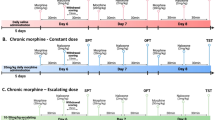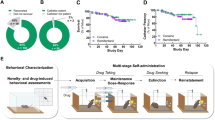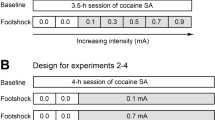Abstract
REPEATED administration of an opiate narcotic leads to the tolerant-dependent state. Previous communications1,2 from this laboratory have described the relationship between the degree of tolerance in mice and the dose, interval and duration of exposure to an opiate. Recently, jumping behaviour elicited by the opiate antagonist, naloxone, was shown to be a sensitive indicator of the degree of dependence3. We have used this method to follow the time courses of the onset and reversal of dependence in various conditions of exposure to opiates.
This is a preview of subscription content, access via your institution
Access options
Subscribe to this journal
Receive 51 print issues and online access
$199.00 per year
only $3.90 per issue
Buy this article
- Purchase on Springer Link
- Instant access to full article PDF
Prices may be subject to local taxes which are calculated during checkout
Similar content being viewed by others
References
Goldstein, A., and Sheehan, P., J. Pharmacol. Exp. Ther., 169, 175 (1969),
Richter, J. A., and Goldstein, A., Proc. US Nat. Acad. Sci., 66, 944 (1970).
Way, E. L., Loh, H. H., and Shen, F., J. Pharmacol. Exp. Ther., 167, 1 (1969).
Gibson, R. D., and Tingstad, J. E., J. Pharmac. Sci., 59, 426 (1970).
Maggiolo, C., and Huidobro, F., Acta Physiol. Latin Amer., 11, 70 (1961).
Litchfield, jun., J. T., and Wilcoxon, F., J. Pharmacol. Exp. Ther., 96, 99 (1949).
Dixon, W. J., J. Amer. Stat. Assoc., 60, 967 (1965).
Goldstein, D. B., and Goldstein, A., Biochem. Pharmacol., 8, 48 (1961).
Goldstein, A., and Goldstein, D. B., Assoc. Res. Nerv. Mental Dis. Res. Pub., 46, 265 (1968).
Goldstein, A., Aronow, L., and Kalman, S. M., Principles of Drug Action (Harper and Row, New York, 1968).
Wikler, A., and Carter, R. L., J. Pharmacol. Exp. Ther., 109, 92 (1953).
Kolb, L., Drug Addiction (Thomas, Springfield, Illinois, 1962).
Chein, I., Gerard, D. L., Lee, R. S., and Rosenfeld, E., The Road to H (Basic Books, New York, 1964).
Wikler, A., and Pescor, F. T., Psychopharmacologia, 10, 255 (1967).
Goldberg, S. R., and Schuster, C. R., Science, 166, 1548 (1969).
Martin, W. R., Jasinski, D. R., Sapira, J. D., Flanary, H. G., Kelly, O. A., Thompson, A. K., and Logan, C. R., J. Pharmacol. Exp. Ther., 162, 182 (1968).
Martin, W. R., and Jasinski, D. R., J. Psychiat. Res., 7, 9 (1969).
Cheney, D. L., Goldstein, A., and Sheehan, P., Fed. Proc., 29, 685 (1970).
Author information
Authors and Affiliations
Rights and permissions
About this article
Cite this article
CHENEY, D., GOLDSTEIN, A. Tolerance to Opioid Narcotics: Time Course and Reversibility of Physical Dependence in Mice. Nature 232, 477–478 (1971). https://doi.org/10.1038/232477a0
Received:
Revised:
Published:
Issue Date:
DOI: https://doi.org/10.1038/232477a0
This article is cited by
-
Morphine, but Not Trauma, Sensitizes to Systemic Acinetobacter baumannii Infection
Journal of Neuroimmune Pharmacology (2011)
-
Acute opioid dependence: characterizing the early adaptations underlying drug withdrawal
Psychopharmacology (2005)
-
Experimental study of the morphine de-addiction properties of Delphinium denudatum Wall.
BMC Complementary and Alternative Medicine (2002)
-
Reinforcement processes in opiate addiction: A homeostatic model
Neurochemical Research (1996)
-
Opioid physical dependence development: effects of single versus repeated morphine pretreatments and of subjects' opioid exposure history
Psychopharmacology (1994)
Comments
By submitting a comment you agree to abide by our Terms and Community Guidelines. If you find something abusive or that does not comply with our terms or guidelines please flag it as inappropriate.



